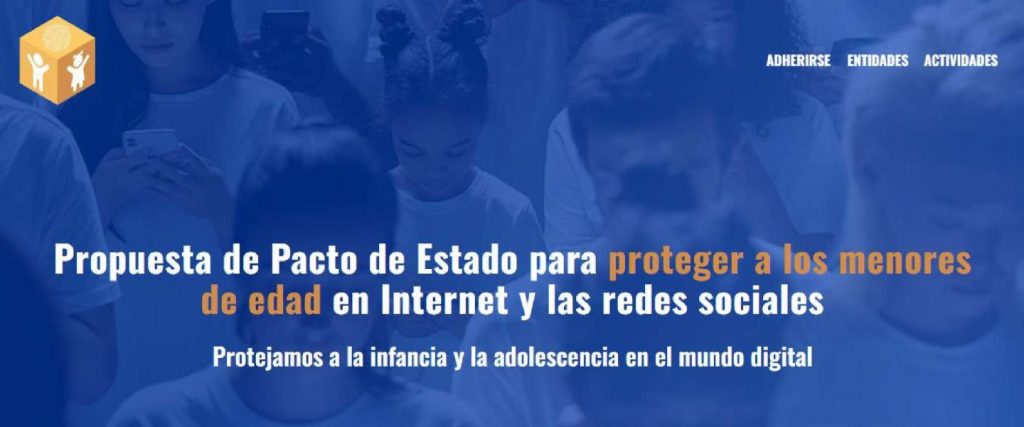
The proposal for a state pact to defend minors in the digital realm now has its own website. At www.pactomenoresdigitales.org, associations, foundations, regulators and citizens can find all the information about this civil society initiative, which is designed to provide a basis for consensus regarding the problems children and adolescents are facing in digital environments.
The state pact is the result of a consensus reached among six entities – the European Association for Digital Transition (EADT), promoter of the initiative, Save The Children, Fundación ANAR, iCMedia, Dale la Vuelta and UNICEF – that also enjoys institutional support from the Juvenile Unit of the Attorney General’s Office (FGE in its Spanish abbreviation) and the Spanish Data Protection Agency (AEPD).
The website, launched on November 20, 2023 and coinciding with World Children’s Day, includes all the forms needed to join the initiative. Since the launch of this initiative, right before summer, the response from civil society has been spectacular. More than 130 entities of every type have already joined, among them the Asociación Española de Fundaciones (AEF), ASUFIN, the Asociación Española de Pediatría, the Club Abierto de Editores (CLABE), the Consejo Audiovisual de Andalucía, the Consell de l’Audiovisual de la Comunitat Valenciana, the Fundación FAD Juventud, the Fundación Mujeres, the Instituto Hermes and the Fundación Atresmedia.
In addition, the website has a complete description of the six organisations who are promoting the pact and a section that compiles all the activities that are developed under the common umbrella of the state pact proposal.
The proposed state pact encompasses the different problematic situations faced by children and adolescents in digital environments in areas such as mental health, bullying, privacy, exposure to extreme violence or sex education. It also focuses on the business model of many digital services and their influence on the socialisation of minors.
The pact consists of fifteen measures that underscore the need to face the problem, train professionals to deal with it, and develop current legislation so that all the actors involved accept their responsibility. The proposals concern various levels of the public administration.
These are the main measures proposed:
- Enforce that algorithms and automatic processing systems be audited by independent third parties and supervisory authorities regarding the protection of privacy, absence of discriminatory biases, manipulation, etc. Likewise, as is done with medications, they must give clear and understandable information to adults: who the service is aimed at, who should not use it, what contraindications it has in special cases, how it should be used and with what limits, how to act in the face of problems, who has verified it works correctly, etc.
- Strengthen the supervisory capacity of the agencies responsible for application of the Digital Services Act (adopted by the EU in 2022) in regard to minors, such as the Spanish National Markets and Competition Commission (CNMC) and the AEPD.
- Establish an accountability framework for the managers responsible for video sharing platforms and content distributors who fail to comply with the obligation to verify age.
- Promote regulation in the Spanish autonomous regions to limit the use of mobile phones in schools and to adapt the use of technological devices in the classroom to age guidelines.
- Implement resources in primary care systems to detect, prevent and confront problematic consumption of the Internet, social networks and pornography by minors.
- Promotion of Schools for Parents to provide them with tools that allow them to educate their children in the responsible use of the Internet and social networks.




